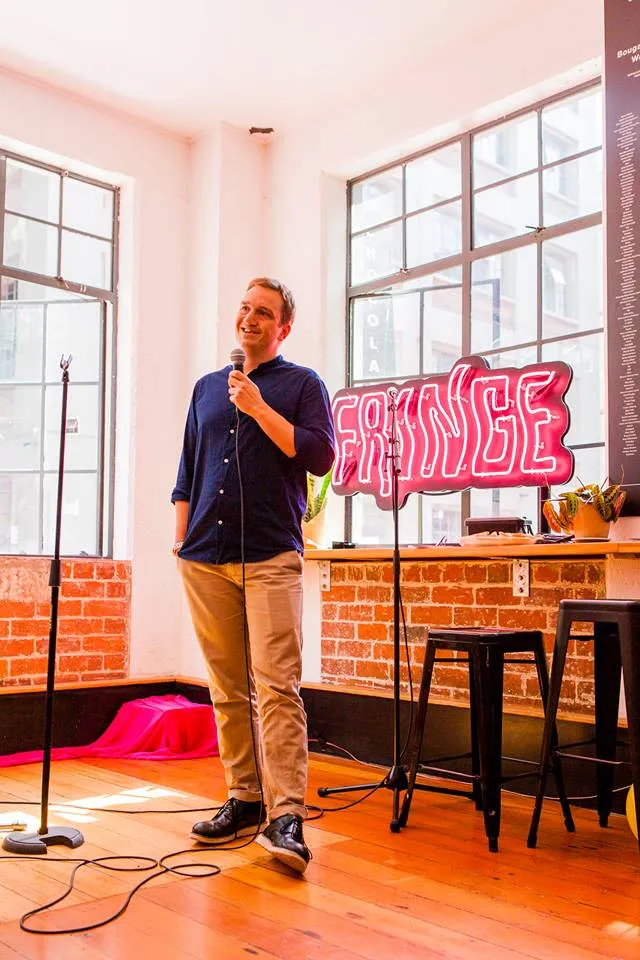WHO got that job? Creative Capital Arts Trust CE

Chief executive (CE) of the Creative Capital Arts Trust (CCAT), Gus Sharp, is not an artist. In fact his CV, with its background in the public and private sector, looks more like one of a management consultant, but his background is exactly why he got his current job. He’s passionate about the arts, and has practical experience in making things happen things like sticking to budgets, managing stakeholders, and planning for the future.
These are the skills that Gus applies every day, as CCAT delivers CubaDupa and the NZ Fringe Festival Wellington. Here’s how he got to where he is:
Law, With Arts On The Side
Gus’ first job was as a corporate lawyer in Auckland. He didn’t hate his job, but he didn’t love it either. His real interest was in his side business: putting on gigs—bringing relatively unknown artists to New Zealand and introducing Kiwis to their music.
He wanted to explore ways to move his career in this direction, so he picked up the phone, cold-called The Big Idea CEO Annie Ackerman, and asked if she wanted to have coffee. She was impressed by his drive and enthusiasm, and he started helping with all kinds of projects in the arts sector.
Fast forward a bit, and Gus had started working as an advisor on MBIE’s Major Events Team. This was more in line with his interests—dealing with the wide variety of stakeholders and contributors to make sure an event goes ahead, opportunities are captured, and everyone gets paid.
This was similar to the work he did in his side business, but at a much larger scale—Gus worked on things like the British and Irish Lions tour to New Zealand, The New Zealand International Arts Festival, and The America’s Cup.
When he saw the CCAT role listed, Gus put his hat in the ring and not long after, he started his first day as chief executive of CCAT.
Tips On How To Get Here
Gus’ main asset is his broad base of experience—he’s been putting on events for more than ten years, as well as building up networks and other skills in various jobs. Here are his tips for getting into arts management:
1) Make yourself useful
In Gus’ first meeting with Annie Ackerman, she told him that rather than ask people for help, you need to ask people how you can help them. He took her advice, and was soon volunteering for The Big Idea and other charitable trusts. By asking people what their problems were, and how he could help, he quickly showed his strengths, which was more valuable than telling people about them.
Gus also emphasised that it was vital that you don’t pigeonhole yourself, either. You don’t need to laser-focus on the specific sector or industry you want to eventually land in. Rather, try to develop a broad network and skill base by doing all kinds of things. This gives you the ability to spot similarities, draw insights and apply processes from a wide range of experiences.
2) Do your best work, and do it quickly
The volunteer work Gus did was fairly straightforward—things like reviewing documents, drafting letters, bouncing ideas and providing feedback on strategic plans. But he made a point of always delivering great work, quickly. This solidified his reputation as a person who can get things done.
3) Stay active in your field
Even though he had a busy full-time job, Gus always stayed active as a music promoter. His company still puts on gigs every few weeks. This kept his skills sharp, as well as maintaining his contacts in the arts industry.
4) Pick up the phone!
There are few things more valuable than networks of people who can vouch for you. So cultivate these networks by arranging meetings with people who you admire, or whose career paths you would like to emulate. Make sure you approach them with a “make yourself useful” mindset, and you’ll end up with people who can advocate for you when you want to go after an opportunity.
5) Go for opportunities
Don’t be afraid to go for opportunities - even if they look daunting. You have nothing to lose, and this is the time to put your networks and experiences to work. So keep an eye out, apply for things that interest you, and you may well surprise yourself.
Who Got That Job?
Did you advertise or find your new job in the creative sector through The Big Idea? Tell us about it!
For 15 years The Big Idea has helped creatives find work and opportunities in New Zealand and arts organisations and creative companies find the right people.
If you've recently appointed someone to a position you can share your announcement in our Media Release section straight away, or to be profiled in this series on senior leadership roles in the creative sector contact editor@thebigidea.co.nz
If you have a new job or position to fill please list it in our Work section, or contact Lena Days advertising@thebigidea.co.nz for more information.